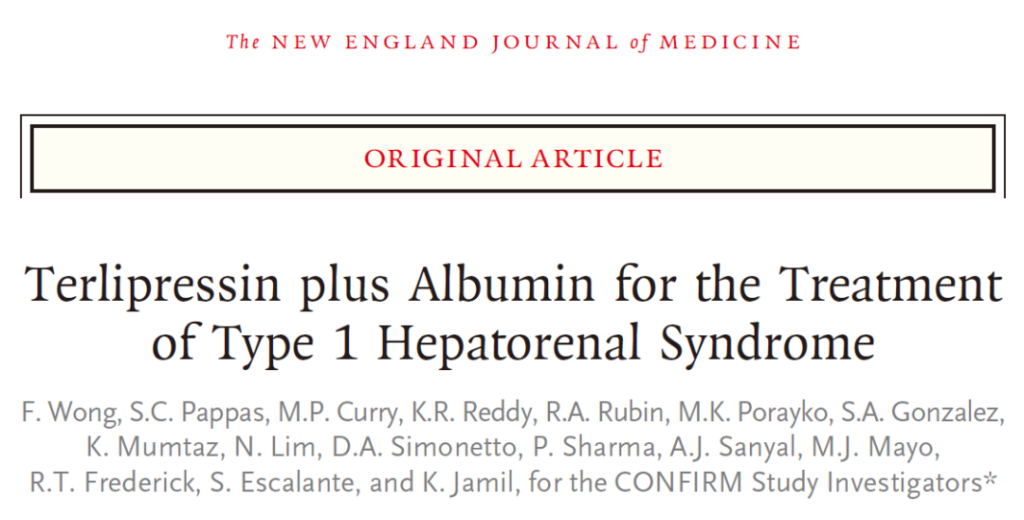Terlipressin plus albumin in the treatment of type 1 hepatorenal syndrome
- Normal Liver Cells Found to Promote Cancer Metastasis to the Liver
- Nearly 80% Complete Remission: Breakthrough in ADC Anti-Tumor Treatment
- Vaccination Against Common Diseases May Prevent Dementia!
- New Alzheimer’s Disease (AD) Diagnosis and Staging Criteria
- Breakthrough in Alzheimer’s Disease: New Nasal Spray Halts Cognitive Decline by Targeting Toxic Protein
- Can the Tap Water at the Paris Olympics be Drunk Directly?
Terlipressin plus albumin in the treatment of type 1 hepatorenal syndrome
Terlipressin plus albumin in the treatment of type 1 hepatorenal syndrome. This study confirms that terlipressin is more effective than placebo in improving renal function in adults with HRS-1 patients, but the serious adverse events including respiratory failure caused by it cannot be ignored.

Vasoconstrictor terlipressin is used in the treatment of type 1 hepatorenal syndrome (HRS-1) in many areas of the world, and is included in the recommendations of European clinical practice guidelines. This study conducted a phase III trial to confirm the efficacy and safety of teripressin + albumin in adults with HRS-1.
The patients were randomly assigned at a ratio of 2:1 and received terlipressin or placebo for 14 days. It is strongly recommended to use albumin at the same time for both groups of patients. The primary endpoint is HRS reversal, which is defined as: 2 consecutive serum creatinine measurements ≤1.5 mg/dl, at least 2 hours apart, and survival without renal replacement therapy for at least 10 days after completion of treatment. Considering multiple comparisons, 4 predetermined secondary endpoints were analyzed using the Hochberg program.
A total of 300 patients were enrolled, including 199 in the terlipressin group and 101 in the placebo group.
63 cases (32%) in the terlipressin group and 17 cases (17%) in the placebo group were confirmed to achieve HRS reversal (P=0.006).
Regarding the pre-set secondary endpoints:
(1) HRS reversal was defined as serum creatinine ≤ 1.5 mg/dl in the first 14 days: 78 cases (39%) in terlipressin group and 18 cases (18%) in placebo group (P<0.001).
(2) HRS reversal was defined as no renal replacement therapy on day 30: 68 cases (34%) in the terlipressin group, 17 cases (17%) in the placebo group (P=0.001)
(3) HRS reversal in patients with systemic inflammatory response syndrome (84 cases in the terlipressin group and 48 cases in the placebo group): 31 cases (37%) in the terlipressin group and 3 cases in the placebo group ( 6%) (P<0.001).
(4) HRS reversal without recurrence was confirmed within 30 days: 52 cases (26%) in terlipressin group and 17 cases (17%) in placebo group (P=0.08).
On the 90th day, 46 patients (23%) in the terlipressin group underwent liver transplantation, and 29 patients (29%) in the placebo group underwent liver transplantation; there were 101 cases (51%) and 45 cases in the two groups, respectively (45%) died.
In terms of adverse reactions, terlipressin occurred more times than placebo, including abdominal pain, nausea, diarrhea and respiratory failure. It is worth noting that 22 patients (11%) in the terlipressin group died of respiratory diseases within 90 days, and only 2 patients (2%) in the placebo group died of respiratory diseases.
This study confirms that terlipressin is more effective than placebo in improving renal function in adults with HRS-1 patients, but the serious adverse events including respiratory failure caused by it cannot be ignored.
(source:internet, reference only)
Disclaimer of medicaltrend.org



